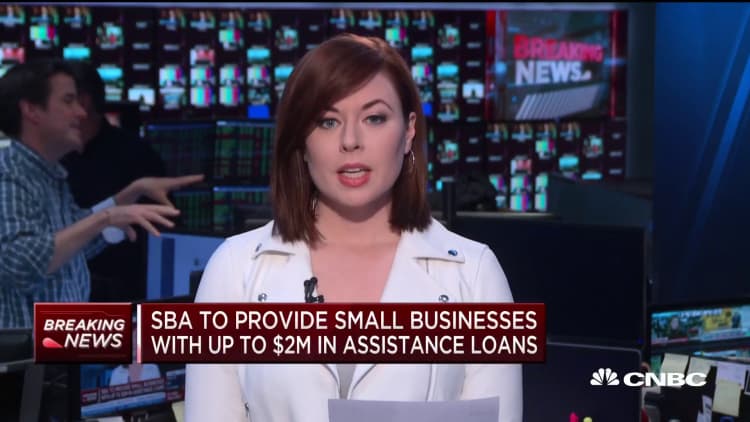Dr. Amir Bastawrous and his wife Dr. Sarah Bastawrous are both physicians working in Seattle, one of the regions hardest hit by the COVID-19 coronavirus.
With Seattle-area schools closed until at least April 24, his wife, who's a radiologist, has had to stay home from the veterans clinic where she works to take care of their daughters. On Thursday, Amir, who's a surgeon and medical director at Swedish, said he canceled appointments with patients as well as elective procedures to be with the kids.
The family is also using some backup care from a local daycare as much as they can -- a benefit offered through Swedish, which is part of the Providence St. Joseph hospital chain. The benefit involves a small co-pay but covers the cost for ten days, which is more generous than most employers in the U.S., including hospitals and clinics.
"The school closure will affect those who rely on out-of-home child care," said Bastawrous. "That's not limited to physicians; it's also environmental services staff, nurses and administrators."
Hospitals across the country are scrambling to figure out how to help their medical staff who are also parents. That extends beyond the providers to the environmental services workers, who are responsible for hygiene and play a vital role in mitigating the risk of infection within hospitals. These workers are needed on site more than ever with the rise of coronavirus cases in the United States.
But many have been left without childcare, and don't have the resources to keep paying out of pocket if school closures stretch out. Now they face a big question: If they're at the hospital caring for a flood of patients who need them, who's looking after their kids?
Beginning of the storm
"We're worried about our workforce," said Providence CEO Rod Hochman by phone.
Hochman said that Providence has hired many doctors who are single parents, as well as couples who are both in the medical profession. "We are thinking about how this will affect their ability to come in to the hospital," said Hochman. "That's troubling as we're at the beginning of the storm, and we think we haven't seen the worst of the virus."
Providence offers its daycare benefit through a local service called Bright Horizons, according to Hochman, and is working to understand how many of their doctors will be impacted. The hospital chain is confident that Bright Horizons, which offers center-based and in-home care, will have capacity to help it through the current situation, and that it's willing to extend the daycare benefit for longer than the customary ten days.
As well as hospitals, the Governor of Washington Jay Inslee also asked on Thursday for free childcare for healthcare workers and first responders who need to be at work.
But experts say there are no obvious solutions with so many parents likely to need childcare. It may not advisable be for kids to be placed with grandparents, who are among the highest-risk groups as the virus continues to spread. Some daycare centers are already closing and others will likely have trouble to keep up with the demand if schools continue to close in other parts of the country.
Making matters more challenging, many doctors in the United States have moved away from their home states for residency programs so they don't have close friends and family nearby.
"The US is still one of the most geographically mobile countries in the world, so there are a lot of people who aren't near any extended family," said Nicole Rodgers, founder and executive director of Family Story, a think tank dedicated to understanding how individuals are forming and reforming families in America.
"I can't imagine what people are going to do with their children. This is when we would ideally lean on our communities and share the burden of filling in and caring for each others' kids. But when we're being asked to practice social distancing, that might not be feasible. It's a truly impossible situation."
The need for collaboration
Some hospitals are thinking in new and innovative ways to keep their health care workers on site.
At UW Medicine in Seattle, clinicians have received emails from human resources about plans to "activate additional resources." The emails, which have been viewed by CNBC, indicated that the health system is talking to local university programs that can match accredited students with "interest in child development" to families in need. The hospital is also hoping to contract with local childcare services.
"Short-term, we are asking that all staff with school-age children quickly review and active their individual disaster contingency plans as they relate to childcare support," one email reads. "This may include turning to friends and family for additional help."
A spokesperson for UW Medicine confirmed that the health system is in the midst of formulating a plan, and that employees currently have access to in-center care or at-home care. The current cap, however, is five uses per employee per calendar year.
Some doctors have been preparing for school closures for weeks independently of their work. Dr. Anita Thomas, an emergency medicine physician at Seattle Children's, said her peers started creating lists of high school-age kids who can watch the younger ones at home while their parents are treating patients.
"There is backup (child)care through some employers but that will definitely get filled," she said.
Dr. Thomas noted that it's also a challenge for partners who can work from home to manage toddlers on their own without help. "It's so hard to do that without resorting to screen time," she said. In her view, collaboration is more important than ever.
"Since daycares and schools are closing and we are required to be there as frontline healthcare staff, there are groups of my colleagues that are banding together," she said.



